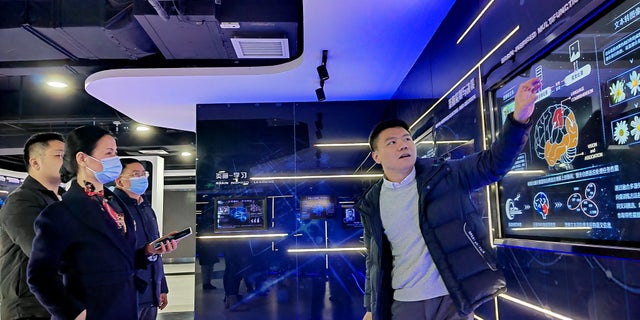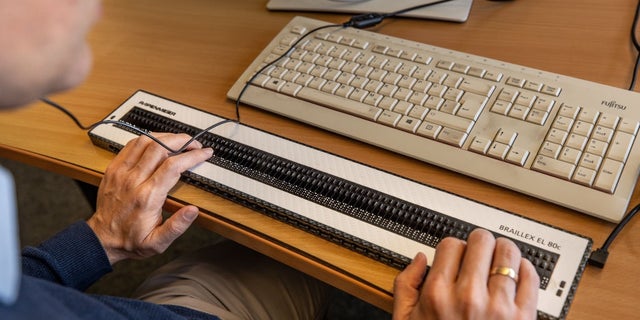Artificial intelligence (AI) is helping people see the world in new ways every day, including the blind, who find AI helping them navigate the world with greater ease and more options than they previously could have imagined.
“I think it will lead to quality of life changes,” Chris Danielsen, director of public relations for the National Federation of the Blind, told Fox News Digital. “I think Braille will always be important – let me just say that we’re big advocates of Braille and the National Federation of the Blind – but … what I think we’re going to see is just that blind people can get more information about their environment.”
The blind community has already utilized new technology with AI-adjacent capabilities for a number of years, notably through the app Be My Eyes, which launched in 2015 and utilized computer vision, which analyzes images and identifies objects within them.
The newest version of Be My Eyes utilizes ChatGPT-4’s multimodal capability to better inspect images and interpret them for the user, TechCrunch reported.
AI TEAMING UP WITH CALIFORNIA FIREFIGHTERS TO SPOT SMOKE BEFORE IT SPIRALS INTO CHAOS
Danielsen said that the technology already helps with small tasks, such as sorting between labels of products at a store or scanning a menu, but the potential for the technology could help a blind person navigate areas they’ve never visited before.
“At our convention in Houston this year, a company called Good Maps actually mapped out the hotel, so what you could do is you could take your phone camera and wave it around and the Good Map software would recognize where you are in the hotel and could tell you what was around you and how to get to and give you turn-by-turn directions,” Danielsen said.
A customer uses the Be My Eyes app while shopping at a grocery store in Los Angeles on Jan. 21, 2021. (Dania Maxwell / Los Angeles Times via Getty Images)
Danielsen said questions remain about the technology – particularly what information it stores, if any – saying that “we need the information about the environment,” but that “doesn’t mean we want to give up our privacy,” noting the heavy reliance on computer vision and therefore mapping out any area in which a blind person may find themselves.
The use of ChatGPT will greatly empower some of the text-to-speech capabilities of existing technology as well as improve screen readers. The most important technological strides will come from the ability to communicate the information that AI reads and interprets to the blind user, Danielsen said.
AI EXPERT WARNS PERSONALIZED CHATBOT TUTORS WILL LIKELY REVOLUTIONIZE EDUCATION AND BENEFIT STUDENTS
The community has mainly focused on ways in which the technology can assist a blind person, rather than any lofty science fiction goal of trying to actually help a blind person see – the Food and Drug Administration in 2015 approved the use of the first artificial retina implant.

Scientists introduce artificial intelligence technologies to the audience in Hefei, China, on Dec. 30, 2021. (Xu Qingyong / Costfoto / Future Publishing via Getty Images)
“For somebody like me who has never seen anything, I don’t know if some kind of interface that actually shows me an image is all that helpful, even if I can’t technically see it,” Danielsen said, noting that he was presenting only a personal opinion and not a position for the organization or wider community.
“We know that from past experience that a lot of blind people who have an eye condition that can be corrected and where they do get some or all of their vision restored actually find it very disorienting, at least at first, because they’re simply not used to their brain having to process visual information,” he continued.
HOW AI COULD CHANGE THE FUTURE OF PREGNANCIES – AND POSSIBLY DO A BETTER JOB THAN DOCTORS CAN
“So, I do think computer vision is important, but I wonder if it’s actually seeing what we want to do versus just getting the information.”
He says part of the challenge is that the blind community still faces the assumption of a very low expectation for blind people to function independently, despite many of them doing so at a highly functional level even before the introduction of technology.

Blind jurist at his computer workstation using Braille keyboard. (Picture alliance via Getty Images)
“A lot of our struggle is actually convincing people that we even understand the world around us and can understand the world around us non-visually,” Danielsen said.
CLICK HERE TO GET THE FOX NEWS APP
“It’s often assumed that because you’re blind, your experience of the world and your ability to interpret your environment is just automatically inferior and that you can never really be sort of a fully functioning human being,” he added, saying that “every day” he meets someone who assumes he “can’t do something pretty basic” because of his condition.
“When we talk about our struggles, our biggest struggle is actually with attitudes … when we talk about the struggles of blind people, I think our biggest problem is that people don’t understand what those struggles actually are and are not.”